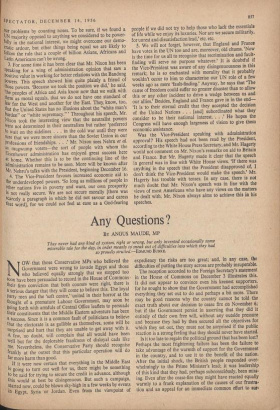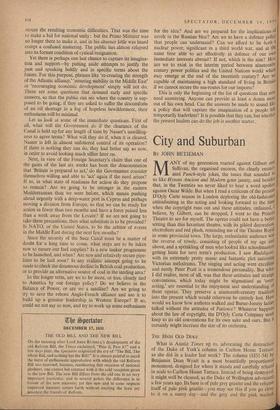Any Questions ?
BY ANGUS MAUDE, MP They never had any kind of system, right or wrong, but only invented occasionally some miserable tale for the day, in order meanly to sneak out of difficulties into which they had so proudly strutted.—EDMUND BURKE.
NOW that those Conservative MPs who believed the Government were wrong to invade Egypt and those who believed equally strongly that we stopped too soon have been persuaded to record in the House of Commons their firm conviction that both courses were right, there is a serious danger that they will come to believe this. The loyal Party men and the 'soft centre,' united in their horror at the thought of a premature Labour Government, may soon be going forth with armfuls of Central Office leaflets to persuade their constituents that the Middle Eastern adventure has been a success. Since it is a common fault of politicians to believe that the electorate is as gullible as themselves, some will be surprised and hurt that they are unable to get away with it. A few, no doubt, will complain that all would have been Well but for the deplorable frankness of disloyal cads like nie. Nevertheless, the Conservative Party should recognise frankly at the outset that this particular operation will do far more harm than good.
If it were now certain that everything in the Middle East is going to turn out well for us, there might be something to be said for trying to secure the credit in advance, although this would at best be disingenuous. But such a campaign, started now, could be blown sky-high in a few weeks by events in Egypt, Syria or Jordan. Even from the viewpoint of expediency the risks are too great; and, in any case, the difficulties of putting the story across are probably insuperable.
The reception accorded to the Foreign Secretary's statement in the House of Commons on December 3 illustrates this. It did not appear to convince even his keenest supporters, for he sought to show that the Government had accomplished everything they set out to do and perhaps a bit more. There may be good reasons why the country cannot be told the exact truth about our decision to cease fire on November 6; but if the Government persist in asserting that they did it entirely of their own free will, without any outside pressure and because they had by then secured all the objectives for which they set out, they must not be surprised if the public reaction is a strong feeling that they should never have started.
Is it too late to regain the political ground that has been lost? Perhaps the most frightening failure has been the failure to take advantage of the warmth of support for the Government in the country, and to use it to the benefit of the nation. After the initial shock, the British people responded over- whelmingly to the Prime Minister's lead; it was leadership of this kind that they had, perhaps subconsci6usly, been miss- ing. Even after the cease-fire they might have reacted equally warmly to a frank explanation of the causes of our frustra- tion and an appeal for an immediate common effort to sur. mount the resulting economic difficulties. That was the time , to make a bid for national unity : but the Prime Minister was no longer there to make it, and in his absence little was heard except a confused muttering. The public has almost relapsed into its former condition of cynical resignation.
Yet there is perhaps one last chance to capture its imagina- tion and support—by putting aside attempts to justify the past and speaking boldly and in specific terms about the future. For this purpose, phrases like 're-creating the strength of the Atlantic alliance,' ensuring stability in the Middle East' or 'encouraging economic development' simply will not do. There are some questions that demand early and specific answers, so that the public can see where the country is sup- posed to be going; if they are asked to suffer the discomforts of an oil, shortage in a fog of hopeless bewilderment, their enthusiasm.will be minimal.
Let us look at some of the immediate questions.. First of all, what will the Government do if the clearance of the Canal is held up for any length of time by Nasser's unwilling- ness to agree terms? What will they do if, when it is cleared, Nasser is left in. almost unfettered control of its operation? If there is nothing they can do, they had better say so now, in order to avoid looking much sillier later on.
Next, in view of the Foreign Secretary's claim that one of the gains of the last six weeks has been the demonstration that 'Britain is prepared to act,' do the Government consider themselves willing and able to 'act' again if the need arises? If so, in what state of readiness for action do they propose to remain? Are we going to be stronger in the eastern Mediterranean than we were before, which means pushing ahead urgently with a deep-water port in Cyprus and perhaps moving a division from Europe, so that we can be ready for action in fewer than two months and have a force poised less than a week away from the Levant? If we are not going to, take these precautions, then what substitute is to be provided? is NATO, or the United States, to be the arbiter of events in the Middle East during the next few months?
Since the security of the Suez Canal must be a matter of doubt for a long time to come, what steps are to be taken now to ensure our fuel supplies? Is a new tanker programme to be launched, and when? Are new and relatively secure pipe- lines to be laid soon? Is any realistic attempt going to be made to check the disastrous decline in British coal production, or to provide an alternative source of coal in the sterling area?
In the longer term, are we to be more, or less, closely tied to America by our foreign policy? Do we believe in the Balance of Power, or are we a satellite? Are we going to try to save the reborn Anglo-French alliance and use it to build up a genuine leadership in Western Europe? If so, could we not say so now, and try to work up some enthusiasm for the idea? And are we prepared for the implications of revolt in the Russian bloc? Are we to have a defence policy that people can understand? Can we afford to be both II nuclear power, significant in a third world war, and at the same time able to act effectively in defence of our ow° immediate interests abroad? If not, which is the aim? Boo are we to exist in the interim period between nineteenth. century power politics and the United Nations world which may emerge at the end of the twentieth century? Are vie capable of maintaining a high standard of living in Britain if we cannot secure the sea-routes for our imports?
This is only the beginning of the list of questions that iloc need answering. Anyone can provide at least a dozen more out of his own head. Can the answers be made to sound like a policy that will capture the imagination of a people left temporarily leaderless? It is possible that they can, but whether the present leaders can do the job is another matter.











































 Previous page
Previous page